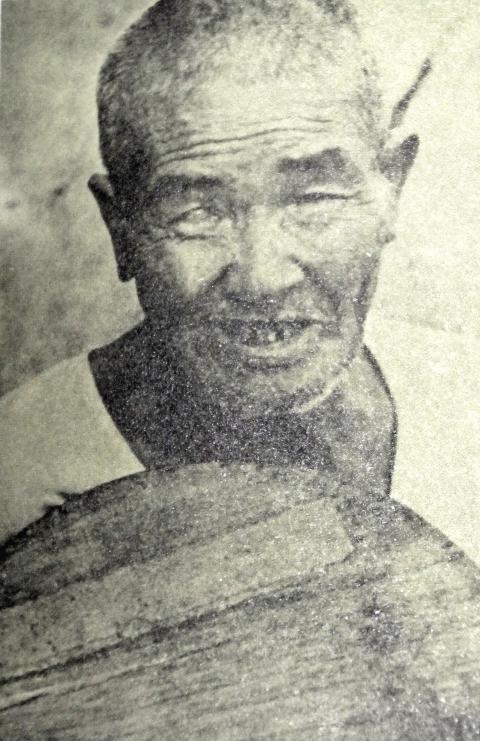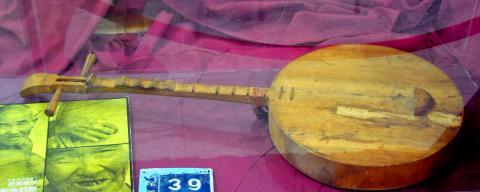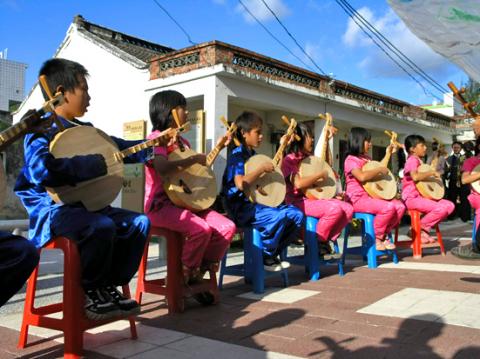Taiwan in Time: April 11 to April 17
Armed with a moon lute (月琴, yueqin) — a traditional Chinese string instrument — 73-year-old Chen Ta (陳達) sat in a recording studio with Cloud Gate Theater director Lin Hwai-min (林懷民) in 1978. Lin started to explain to Chen the scene he had in mind from the story of Han Chinese immigration from China to Taiwan when Chen interrupted him.
“I know that story,” Chen said. He asked for two cups of rice wine, adjusted his instrument and launched into a detailed, improvised epic. Three hours later, Lin told Chen they had recorded enough material. Chen protested, “I haven’t gotten to the part about Chiang Ching-kuo (蔣經國) yet!”

Photo: Chen Yan-ting, Taipei Times
He then sang about Chiang, and finished with: “Taiwan became a great place, known by everybody 300 years later.”
That is how Chen, who was illiterate, formed his songs. And he could seemingly go on forever, and was asked at least once to leave the stage because he exceeded his allotted time.
Folk music expert Chien Shang-jen (簡上仁), who recounted the story above in his preface to Chen’s biography The Wandering Bard Chen Da (遊唱詩人陳達) by Hsu Li-sha (徐麗紗), refers to Chen’s songs as “improvised poems based on the time, place and event of that moment.”

Photo: Tsai Tsung-hsien, Taipei Times
His neighbor Chiang Hsiu-ying (江秀英) recalls in the biography that when Chen visited her home, he would first ask her father about the family’s situation and then make up a song on the spot about what he was just told.
“It was always positive and auspicious, and my father would be very happy,” she said. They would then give him some rice or money to buy food.
Born and raised in Hengchun (恆春), Chen learned his craft from his brothers and was considered somewhat of a delinquent for playing music all day and not working in the fields. He honed his skills while working in Taitung (台東) and singing Hengchun-style folk songs with other migrant workers from his hometown.

Photo: Kuo Fang-chi, Taipei Times
Chen began his career as a traveling musician after returning to Hengchun when he was 20 years old, often walking all day from town to town. He was popular among locals — often bringing his audience to tears — but lived in poverty. Handicapped after a stroke at age 29, he never married as a result but is said to have fathered a son with a widow.
Chen did not expect his big break to come in his 60s.
In 1966, Hsu Chang-hui (許常惠) and Shih Wei-liang (史惟亮), both European-educated musicians, decided that Taiwan also needed its own music and set out to document local folk music that was disappearing to Western tunes.
Hsu was saddened by the state of Chen’s life, writing in his journal: “He has no family (no parents, children or relatives), living alone in a house unsuitable for human habitation (if it can be considered a house at all).”
“When he picked up his yueqin and sang with his voice that sounded like cries of grief…I felt that I found it, I found the soul of the Chinese folk music I had been searching for so many years,” Hsu added.
Hsu and Shih then recorded Chen’s songs and released them as records — one of them contained a single long epic on a tragedy involving a father and son who lived in Hengchun. They also actively promoted Chen’s music, attracting much media attention. Chen appeared on television for the first time in a special news program in 1972, where he improvised a song about “two good men who come from Taipei to the south to film a television program.”
Chen became famous — but he still continued to live in poverty, collecting recyclables when he wasn’t playing music. Hsu Li-sha writes that his neighbors considered Chen a talented man but still somewhat looked down on him because he did not have a proper job. This opinion would not change with his fame.
In the late 1970s, Chen was invited to Taipei as a resident performer in a Western music restaurant Scarecrow (稻草人), whose owner wanted to shake things up to save his often empty establishment. Known to never sing the same lyrics twice, he packed the house for two months — but still wore the same tattered clothes, leisurely drinking tea and chewing betel nut as if he were still in Hengchun.
Chen celebrated his 72th birthday in Taipei. It was the first time he had cut a Western-style cake, and he sang a song about it. A few days later, he was the main act at the first annual Folk Artist Music Festival organized by Hsu Chang-hui.
Tired of life in the big city, he eventually returned home, exhausted his earnings and by 1980 he had returned to his old life as a traveling musician, although he would still make trips to perform at schools and other events in Taipei.
On April 11, 1981, Chen was hit by a bus on his way to Hengchun. He died that night.
Taiwan in Time, a column about Taiwan’s history that is published every Sunday, spotlights important or interesting events around the nation that have anniversaries this week.

Most heroes are remembered for the battles they fought. Taiwan’s Black Bat Squadron is remembered for flying into Chinese airspace 838 times between 1953 and 1967, and for the 148 men whose sacrifice bought the intelligence that kept Taiwan secure. Two-thirds of the squadron died carrying out missions most people wouldn’t learn about for another 40 years. The squadron lost 15 aircraft and 148 crew members over those 14 years, making it the deadliest unit in Taiwan’s military history by casualty rate. They flew at night, often at low altitudes, straight into some of the most heavily defended airspace in Asia.

This month the government ordered a one-year block of Xiaohongshu (小紅書) or Rednote, a Chinese social media platform with more than 3 million users in Taiwan. The government pointed to widespread fraud activity on the platform, along with cybersecurity failures. Officials said that they had reached out to the company and asked it to change. However, they received no response. The pro-China parties, the Chinese Nationalist Party (KMT) and Taiwan People’s Party (TPP), immediately swung into action, denouncing the ban as an attack on free speech. This “free speech” claim was then echoed by the People’s Republic of China (PRC),

Many people in Taiwan first learned about universal basic income (UBI) — the idea that the government should provide regular, no-strings-attached payments to each citizen — in 2019. While seeking the Democratic nomination for the 2020 US presidential election, Andrew Yang, a politician of Taiwanese descent, said that, if elected, he’d institute a UBI of US$1,000 per month to “get the economic boot off of people’s throats, allowing them to lift their heads up, breathe, and get excited for the future.” His campaign petered out, but the concept of UBI hasn’t gone away. Throughout the industrialized world, there are fears that

Like much in the world today, theater has experienced major disruptions over the six years since COVID-19. The pandemic, the war in Ukraine and social media have created a new normal of geopolitical and information uncertainty, and the performing arts are not immune to these effects. “Ten years ago people wanted to come to the theater to engage with important issues, but now the Internet allows them to engage with those issues powerfully and immediately,” said Faith Tan, programming director of the Esplanade in Singapore, speaking last week in Japan. “One reaction to unpredictability has been a renewed emphasis on